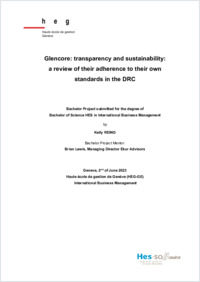Glencore : transparency and sustainability : a review of their adherence to their own standards in the DRC
SONAR|HES-SO
- Reino, Kelly
- Lewis, Brian (Degree supervisor)
- Genève : Haute école de gestion de Genève
60 p.
Bachelor of Sciences HES in International Business Management: Haute école de gestion de Genève, 2023
English
In a changing world, sustainability has become one of the most discussed and monitored topics due to its critical and pressing issue. The commodities industry, in particular, has gained more attention due to the social and environmental impacts it causes. This has led to greater pressure on the industry to do more to develop sustainable practices. This thesis focuses on Glencore, one of the largest mining and commodities companies with operations in politically unstable countries, and its activities in the Democratic Republic of Congo (DRC). The group has been the subject of much scrutiny over the years and is also amongst one the biggest polluters within the sector.
Transparency is closely linked to sustainability as it shows good faith and makes it possible to monitor the effects of a company’s operations. As Glencore has been a public company since 2011, it must now disclose specific information concerning the various subjects of its operations.
Shifting towards a green energy economy is amongst the most important topics nowadays, which has increased the demand for copper and cobalt which are crucial components of electric batteries. Most of the supply of these minerals comes from the Democratic Republic of Congo, a highly politically unstable economy in which Glencore has been operating for many years. The various misconducts involving Glencore in the DRC have worsened the company’s bad reputation, and as the demand for minerals is expected to increase even further, it is legitimate to examine Glencore’s conduct.
As transparency and sustainability have become more important, Glencore has increased its presence among multiple initiatives which aim at making companies accountable for their operations. By comparing Glencore’s statements and standards with their practices we were able to identify inconsistencies and numerous topics needing
improvements.
The main recommendation to prevent these wrongdoings is to be genuinely more transparent as a way of being more accountable and find approaches to prevent or mitigate the negative impacts of Glencore. Interacting with external stakeholders would also be beneficial to identify which areas contain issues and bring forward potential solutions that actually help the local communities and the environment.
Transparency is closely linked to sustainability as it shows good faith and makes it possible to monitor the effects of a company’s operations. As Glencore has been a public company since 2011, it must now disclose specific information concerning the various subjects of its operations.
Shifting towards a green energy economy is amongst the most important topics nowadays, which has increased the demand for copper and cobalt which are crucial components of electric batteries. Most of the supply of these minerals comes from the Democratic Republic of Congo, a highly politically unstable economy in which Glencore has been operating for many years. The various misconducts involving Glencore in the DRC have worsened the company’s bad reputation, and as the demand for minerals is expected to increase even further, it is legitimate to examine Glencore’s conduct.
As transparency and sustainability have become more important, Glencore has increased its presence among multiple initiatives which aim at making companies accountable for their operations. By comparing Glencore’s statements and standards with their practices we were able to identify inconsistencies and numerous topics needing
improvements.
The main recommendation to prevent these wrongdoings is to be genuinely more transparent as a way of being more accountable and find approaches to prevent or mitigate the negative impacts of Glencore. Interacting with external stakeholders would also be beneficial to identify which areas contain issues and bring forward potential solutions that actually help the local communities and the environment.
- Language
-
- English
- Classification
- Economics
- Notes
-
- Haute école de gestion Genève
- International Business Management
- hesso:hegge
- Persistent URL
- https://sonar.ch/global/documents/327645
Statistics
Document views: 1238
File downloads:
- IBMBT_23_REINO_Kelly_VF.pdf: 1081
